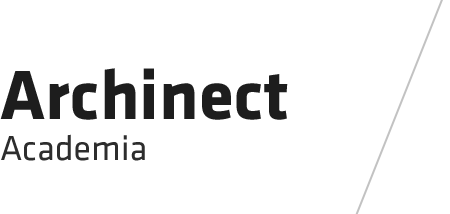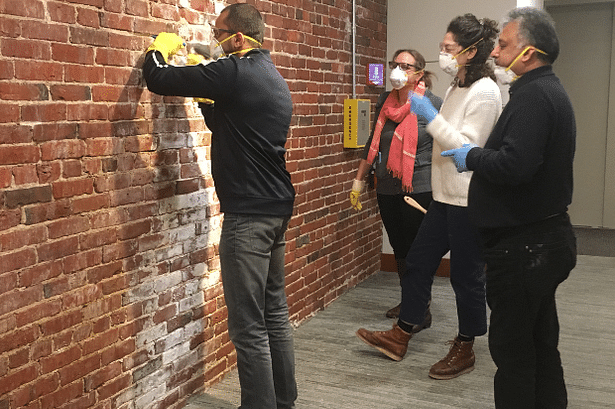
Boston, MA

Visit included workshops in Boston and a trip to San Francisco for the PastForward conference
The Boston Architectural College (BAC) recently welcomed faculty from the National College of Arts (NCA) in Lahore, Pakistan, for a weeklong visit that included workshops at the BAC, a visit with representatives from the U.S. Department of State, and a trip to San Francisco, CA, for the National Trust for Historic Preservation's PastForward conference. The trip was part of the BAC's and NCA's University Partnership program, a two-year grant through the U.S. Department of State.
The visit began with discussions around the NCA setting up a field school within the medieval walled city of Lahore and how the BAC's historic preservation program can assist with that process. "The school will serve as a repository for conservation heritage and a research center for students, faculty, and the community," says Faisal Sajjad, professor of Architecture at NCA. "The NCA acquired the land in 2001 and have worked on developing and improving it since. We are keen on partnering with the BAC because of our relationship through these grants. We want to increase our capacity for students and have this also be a field school for BAC students."
Rebekah Krieger, conservator with The National Park Service in the Northeast Regional Office and adjunct Historic Preservation faculty at the BAC, then led the group in a three-day materials conservation workshop. "In the workshop, we talked about a master's education in architectural materials and conservation science, and I shared some of the BAC's educational techniques with NCA faculty," says Rebekah. "We also did an experiment mixing mortars, using different ratios of sand, lime, and water, as well as using different types of lime, to see how quickly the mortars set."
"The workshop also tested two different historic bricks-one made in the 1800s and one made around 1900," says Rebekah. "Because of when they were made, the bricks have different physical properties. The bricks were also produced in different locations which would have different conditions. We set the bricks up in identical settings where they are partially submerged in water to see how they absorb water differently. We examine the bricks at different intervals to see how much water they are absorbing and how each brick retains water in different ways."
NCA faculty found the workshop very interesting. "NCA is developing a master's program and one of the areas is conservation, so this trip has been very helpful in shaping the curriculum and shaping the structure of the program by comparing BAC and NCA methods," says Professor Sajjad. "Through this mutual learning process, we have found areas to improve on so that our program can be successful."
Dr. Farida Batool, head of Cultural Studies Department at NCA, agrees on the benefits of the mutual learning process, "This partnership has given me a good opportunity to be more reflective on Pakistan's structures by seeing the BAC's approach to education. I'm starting to think more concretely about future endeavors with our design education."
The most recent visit by NCA faculty to the BAC also included a visit from Richard Boyum, university partnership coordinator for the U.S. Department of State, Bureau of South & Central Asian Affairs, in Washington, D.C., and overseer of the BAC's and NCA's University Partnership program. Richard was thrilled to have the opportunity to attend part of the materials conservation workshop and the BAC's and NCA's discussions about the NCA's field school.
"We really appreciate the warm relationship with the BAC and the outstanding job that the BAC has done in raising awareness for cultural heritage preservation in Pakistan," says Richard. "It is always great to visit Boston and the BAC and see how the partnership continues to develop. It's exciting to see what the BAC and NCA are working on now and what they are planning to do next."
Next up for the BAC is our annual trip as part of the University Partnership program to visit NCA in March 2019. This trip will include a series of workshops led by Rebekah to demonstrate traditional building techniques with NCA students. Rebekah has already presented the BAC course to NCA faculty, showing how material is introduced to students, what the students do throughout the course, and what comes out of the course.
For her part, Rebekah is excited to make her first trip to Pakistan and share her knowledge with NCA students. "This partnership is a wonderful opportunity for a cross-cultural exchange of architectural building techniques and teaching methodologies. I am really looking forward to seeing the architecture and the culture of Pakistan, and seeing it through NCA faculty's eyes and perspective. I am also really excited to learn more about their history, culture, and traditions."
About the BAC and NCA University Partnership
The BAC started working with the NCA in 2013 after applying for funding and being selected to be part of the U.S. Department of State's University Partnership program. The goals of that first grant were to introduce historic preservation courses into NCA's undergraduate architecture program, develop digital archival methods at NCA, bring NCA students to the United States in a cultural exchange and have BAC students study abroad for their fall semester, and set up field schools opportunities in Pakistan.
In 2017, the partnership was extended with another two-year grant from the U.S. Department of State. Having already focused on adding programs and curriculums in the first grant, NCA wanted to focus on faculty training and development for the new direction of the partnership. This will be accomplished by developing new courses and improving existing courses in their cultural studies and architecture programs, developing technical skills in historic preservation in documentation and materials conservation, working with NCA faculty in developing teaching skills and curriculum development methods, and continuing the cultural exchange and travel between the United States and Pakistan.
No Comments
Block this user
Are you sure you want to block this user and hide all related comments throughout the site?
Archinect
This is your first comment on Archinect. Your comment will be visible once approved.